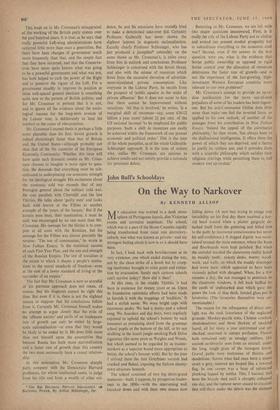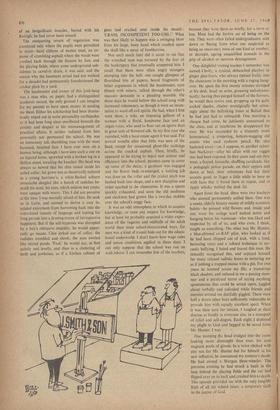John Bull's Schooldays
On the Way to Narkover
By KENNETH ALLSOP MY education was averted in a dank atmo- sphere of Portuguese laurels, dim Victorian rooms and surrealist ineptitude. The school, which was in a part of the Home Counties rapidly being transformed from rural into dormitory- suburb, was what was known as private—and my strongest feeling about it now is so it should have been.
In fact, 1 look back with bewilderment at its very existence, one which ended during the war, not by the clean strike of a bomb but by creep- ing insolvency brought to crisis point and extinc- tion by evacuation. Surely such cartoon schools can't survive today? How did it then?
At this time, in the middle Thirties, it had been in existence for twenty years or so. Upon its foundation optimistic efforts had been made to furnish it with the trappings of 'tradition.' It had a stylish name. We wore bright caps with enormous peaks. We had a motto and a school song. We, boarders and day boys, were regularly enjoined to uphold the school's honour by such measures as remaining aloof from the grammar school pupils at the bottom of the hill, or by not skulking in the laurel jungle smoking Park Drive cigarettes (the same price as Weights and Woods, but which• seemed to be regarded by us trainee- smokers as a superior brand more appropriate to betray the school's honour with). But by the time I arrived there the thin Greyfriars varnish had cracked and flaked, exposing the forlorn shanty- town structure beneath.
The school consisted of two big sham-grand mansions—built, I suppose, by prosperous trades- men in the 1890s—with the intervening wall knocked down and with their own stucco now falling down. (A new boy trying to cringe into invisibility on his first day there received a hor- rid head .wound when a plaster gargoyle de- tached itself from the guttering and felled him to the path; he recovered consciousness but never his self-confidence.) A dogged dignity was main- tained around the main entrance, where the brass and floorboards were kept polished. But when the corridor reached the classrooms reality bared its mouldy teeth: rickety desks, wormy wood- work, and walls, on which the muddy distemper had worn bare, which appeared to have been viciously pelted with shrapnel. When, for a few minutes a day, the sun managed to penetrate to the classroom windows, it fell back baffled by the curds of undisturbed dust which gave the panes the look of that thick, frosted glass put in lavatories. (The lavatories themselves were nn- mentionable.) The reason for the infrequency of direct sun- light was the rank luxuriance of the neglected grounds. Monkey-puzzle trees, Chinese conifers, rhododendrons and those thickets of speckled laurel, all for many a year untrimmed and up- checked, swarmed in sinister profusion. Flower beds remained only as smudgy outlines, like ancient earthworks seen from an aircraft, under the long, tough grass of the insurgent lawns. Gravel _paths were mattresses of thistles and dandelions. Across what had once been a tennis court a grey, tattered net looped like a lowered flag. In one corner was a heap of splintered planking lapped by nettles. This, I learned, had been the bicycle shed until it abruptly collapsed one day, and the rumour never ceased to circulate that still there under the debris was the skeleton of an insignificant boarder, buried with his Raleigh; he had never been missed.
The conquering return of vegetation was countered only where the pupils were permitted to roam—hard ribbons of beaten mud, an ex- panse of crumbling asphalt where the weeds were crushed back through the fissures by feet, and the playing fields, where some underground sub- sidence (a caved-in drain, it was said, and the reason why the basement urinal had not worked for a decade) had permanently foreshortened the cricket pitch by a yard.
The headmaster and owner of this junk-heap was a man who, on paper, had a distinguished academic record, the only ground I can imagine for my parents to have spent money in sending me there. Either his scholarship had been drama- tically wiped out in some personality earthquake, or it had been long since smothered beneath the anxiety and despair at his mismanagement of practical affairs. It neither radiated from him personally nor permeated the school. He was an immensely tall, shambling man with the most harassed, haunted face I have ever seen on a human being, although I have seen such a one on an injured horse, sprawled with a broken leg in a Belfast street, awaiting the knacker. His head was always so bowed that his chin rested inside his soiled collar; his gown was as theatrically tattered as a young barrister's; a white-flecked auburn moustache dangled like a bunch of radishes be- neath his nose; his eyes, which seldom met yours, were opaque with worry. This I did not perceive at the time. I was mortally afraid of him. He took us in Latin, and seemed to derive a cosy in- sulated enjoyment from burrowing back into the convoluted tunnels of language and lapsing for long periods into a droning trance of introspective happiness. But if the self-hypnosis was disrupted by a boy's obtrusive stupidity, he would appar- ently go insane. Chin jerked out of collar; the radishes trembled and shook; the eyes swirled like stirred ponds. `Fool,' he would say, at first quietly and levelly, and than in a clattering of teeth and jawbones, as if a kitchen cabinet of pans had crashed over inside his mouth: `CRASS, INCOMPETENT FOO-UHL!' What was then likely to happen was a swinging blow from his large, bony hand which crashed upon the skull like a spray of knobkerries.
Not until much later did it occur to me that the wretched man was tortured by the fear of the bankruptcy that eventually scuppered him. I recall that there were often angry strangers stumping into the hall; one caught glimpses of flourished bits of papers, heard fragments of bitter arguments in which the headmaster, eyes filmed with misery, talked through the other's staccato demands• in a pleading mumble. On those days he would bellow the school song with increased vehemency, as though it were an incan- tation to ward off evil spirits. He had, when I first went there, a wife, an imposing galleon of a woman with a florid, handsome face and an organ voice, who used to float out on sports days in great sails of flowered silk. In my first year she vanished, with a local estate agent it was said. For several months after that little was seen of the head, except for occasional ghost-like stalkings across the crackzd asphalt. Then, briefly, he appeared to be trying to inject new ardour and efficiency into the school; painters came to cover up some of the decay, a gardener was engaged and the flower beds re-emerged, a welding job was done on the roller and the cricket pitch was bashed back into shape, and a new discipline and order sparked in the classrooms. It was a spasm quickly exhausted, and soon the old seediness and slackness had grown like a two-day stubble over the school's soggy face.
It was an odd atmosphere in which to acquire knowledge, or even any respect for knowledge, but at least we probably acquired a wider exper- ience of the vagaries and oddballs of the adult world than most school-incarcerated boys, for ours was a kind of transit hide-out for the educa- tional underworld. I don't know how wage rates and union conditions applied in those days. I can only suppose that the school was run on scab labour. I can remember few of the teachers, because they were there so briefly, for a term or less. Most had the furtive air of being on the run. They were often failed undergraduates, sent down or fleeing from what one suspected as being an unsavoury mess of one kind or another, or decrepit, ageing unqualified nomads in the grip of alcohol or nervous derangement.
One delightful visiting teacher I remember named Cholly, a cynical, debauched playboy in ginger plus-fours, who always tiptoed frailly into the classroom in the morning with a raging hang- over. He spent the first twenty minutes slumped at his desk, head on arms, groaning melodrama- tically; having thus purged himself of the horrors. he would then revive and, propping up his gaily socked shanks, chatter nostalgically but amus- ingly about the hellraking times at Balliol that he had just had to relinquish. One morning a cheque had come, he jubilantly announced to the class, and at lunchtime he disappeared for ever. He was succeeded by a blatantly overt homosexual, a simpering, bottom-wagging old auntie who used eyebrow pencil. He also hastened away—on, I suppose, to another subur- ban Narkover--after his affair with our rugger star had been exposed. In they came and out they went, a frayed, farouche, shuffling cavalcade, like a pedagogic police parade, on their uppers and down at heel, their references bad but their accents good, to lir.ger a little while to bore us with facts that it bored them to repeat, and to tipple whisky behind the desk lid.
Apart from the head, there were two teachers who seemed permanently settled there. One was a sunny, elderly history master• of mildly eccentric habits—he pressed wild- flowers and, inside and out, wore his coilege scarf tucked down and hanging below his waistcoat—who was liked and respected by all of us, and who even, I think, taught us something. The other was Mr. Hunter, a blue-chinned ex-RAF pilot, who looked as if he had been chipped out of teak, with a loud. hectoring voice and a refined technique in sar- castic bullying. I hated and feared this man. He instantly recognised this, and enjoyed himsel f for many relaxed sadistic hours in torturing me as if jabbing a trapped mouse with a pin. For two years he loomed across my life, a monstrous black shadow, and induced in me a passing stam- mer and a paralysed terror of saying anything spontaneous that could be seized upon, juggled about verbally and ridiculed while friends and enemies around me dutifully giggled. There were half a dozen other boys sufficiently vulnerable to provide him with equally excellent sport. When it was their turn for torture, I laughed at their distress as loudly as everyone else, in a transport of relief and self-disgust. Each night I deplored my plight to God and begged to be saved from Mr. Hunter. I was.
One morning th.: head trudged into the 'room looking more distraught than ever, his eyes stagnant pools of gloom. In a voice choked with pity not for Mr. Hunter but for himself in his new infliction, he announced my torturer's death. He had owned a Morgan three-wheeler. The previous evening he had struck a bank in the lane behind the playing fields and the car had flipped over on its back and crushed him to death. This episode provided me with the only tangible fruit of all my school years, a temporary faith in the justice of God.











































 Previous page
Previous page